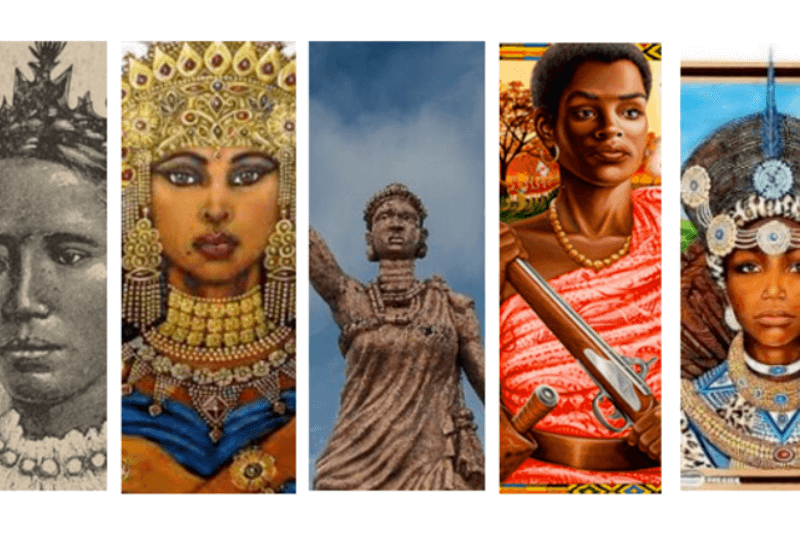In the ancient world, Africa was home to some of the world’s greatest rulers. These included queens who ruled their kingdoms with precision and power. The impact of their leadership has left an indelible mark on history. Here we take a look at some of the most dynamic African queens of antiquity.
Queen Aminatu
The daughter of Bakwa Turunku, Queen Aminatu was a great Hausa warrior. She was known as a warrior princess, having inherited her mother’s assertive and precise character.
Zazzau, the capital, was built by her mother. It was one of the original seven states of Hausaland in the 16th century. Amina chose to hone her military skills as a member of the royal family. She rapidly became one of Zazzau’s greatest warriors.
Her intelligent tactics extended the borders of Zazzau.
She was also the architect of Hausaland’s fortified walls. She had a career as a warrior and princess that spanned more than three decades.
Makeda, Queen of Sheba
The 14th century Ethiopian royal epic, the Kebra Nagast or ‘Glory of Kings’, writes that Makeda was a queen of incredible strength.
She survived a battle with the snake king Awre, according to the epic. The snake-king was troubling the kingdom of Aksum, in northern Ethiopia. Having defeated the snake-king, Makeda became Queen of Aksum.
The story of Makeda’s relationship with the biblical King Solomon of Jerusalem is famous. Together they had a son named Menelik I (or Ebna la-Hakim), which means ‘son of the wise’. Menelik’s son became the first imperial ruler of Ethiopia and the first in a line of Aksumite kings.
Historians believe that Makeda and his son brought the biblical Ark of the Covenant to Aksum. They gave birth to a line of great kings of East Africa and Nubia.
Queen Nefertiti
Nefertiti was an important queen of ancient Egypt. She was known by the name of Nefertiti, which means ‘a beautiful woman has arrived’. Her legacy is one of strength, beauty and power.
She was either born in the city of Akhmim or in a country in present-day Syria. According to historians, she married Akhenaten, who ruled Egypt from 1353 to 1336 BC.
They had six children together, including the famous King Tutankhamun. Above all, the couple are known for their exploits in expanding the Egyptian nation. They were responsible for establishing the cult of Aten. In this religion, the sun god Aten was the central figure. They were also at the forefront of Egyptian culture, promoting the nation’s art and language.
They formed a couple who flaunted their love for each other in public. Their public displays of affection changed Egyptian culture. These demonstrations were unusual for the pharaohs of the time.
Queen Ranavalona I of Madagascar
From 1788 to 1861, Queen Ranavalona I ruled Madagascar. She was originally of Merina origin, the island’s largest ethnic group.
During her reign of 33 years, she made Madagascar an independent state. She resisted European colonialism. By doing so, she maintained the cultural and political sovereignty of her nation. Colonialists saw her as a tyrant, while her people saw her as a patriotic leader.
Keep Reading
Queen Cleopatra of Egypt
Cleopatra was a popular political figure in ancient Egypt.
Her story has inspired many historians and storytellers. English playwright William Shakespeare based his famous play ‘Antony and Cleopatra’ on her life.
She was born into a royal family around 69 BC. Following the death of her father, King Ptolemy XII, she and her brother ascended the throne. At the time, she was 18 years old. Relations between them became strained after their accession to power. So Cleopatra assembled an army to overthrow her brother.
With the help of Julius Caesar of Rome, she defeated him at the Battle of the Nile. Cleopatra met the emperor when he took refuge in Egypt during Rome’s civil war. Some historians believe that they had a child together, named Caesarion.
After the assassination of Caesar, Cleopatra met Mark Antony. The love story between the two lovebirds was tumultuous and still inspires many storytellers. The Queen died of snakebite from an Egyptian cobra in 30 BC.
Anthony committed suicide after receiving false information that Cleopatra had died during the battle of Actium. The two were buried together as they had wished, and Egypt became a province of the Roman Empire.
Queen Nandi of the Zulu kingdom
Nandi was the mother of Shaka Zulu, one of the greatest kings of the Zulu kingdom. Zulu was a superpower in the southern African region. The story of Queen Nandi is one of a mother’s resilience and hope in the face of social pressures.
According to historians, she became pregnant by Shaka Zulu out of wedlock. He was the son of King Senzangakhona. She was subjected to great humiliation but remained determined to raise her son.
She was a voice of reason during periods of political conflict with neighbouring kingdoms. King Shaka was able to achieve many feats thanks to her support. He expanded the borders of the Zulu kingdom over a period of 12 years.
The dignitaries and the Zulu people marked the death of Queen Nandi with a long period of mourning. This period was called ‘Isililo SikaNandi’.

